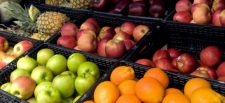After almost 20 months of gestation, the Agriculture Bill is due to come into being this week when it is expected to complete its final stages in the House of Commons without significant amendments. The Sustainable Food Trust (SFT) says it feels the Government will be making a huge mistake if it pushes through this Bill in its current form.
The legislation will replace the Common Agricultural Policy in England in relation to food and farming. Yet, according to the Sustainable Food Trust (SFT) neither food nor farming feature in the Bill in any meaningful way.
SFT says as a result, the Bill fails to address the existing threats to food security and the new ones posed by Covid-19. It also claims it fails to address the longstanding problem of an unsustainable food system producing too little of the foods, especially fruit and vegetables, needed for optimum health.
The Bill was conceived, drafted and amended in a period before the first cases of the virus emerged here. It also takes no account of the UK’s already high dependence on imported food and fragile just-in-time delivery systems, the fact that food shortages are already developing in many parts of the world, that large amounts of food are being wasted due to the impact of Covid-19 or that a significant number of food exporting countries are restricting sales to ensure sufficient supplies for their own populations, all of which is increasing global food prices.
“I was born in 1950 when food rationing was still in place and my parents’ generation never forgot the huge mistake the inter-war governments made by abandoning British farmers and placing their faith in imported food”
SFT chief executive, Patrick Holden said: “The first responsibility of any nation is to feed its people with adequate quantities of health-giving food. I was born in 1950 when food rationing was still in place and my parents’ generation never forgot the huge mistake the inter-war governments made by abandoning British farmers and placing their faith in imported food.
“Contrary to Defra’s claims that, freed from CAP regulations, farmers will be able to increase their productivity and produce food in a more sustainable way, this Bill will force tens of thousands of farmers into bankruptcy, force those that survive to become more, not less, intensive, and see us importing yet more of our daily nutritional needs from other countries, with more and more of that food brought in by air at high environmental cost.”
Holden continued: “We only have to look at the eye-watering sums being spent to address the coronavirus pandemic to see how vastly more expensive it becomes when we fail to prepare for predictable crises before they happen. With Covid-19 impacting every country and likely to have continuing effects for years, and farmers facing extreme weather more and more frequently all over the planet due to climate change, we should now be planning for disruptions to the food supply by ensuring that we produce most of our basic nutritional needs at home.”
Suggested amendments
The SFT says it would like to see the Bill make all farms more productive, sustainable and nature friendly. For this, it needs whole farm management agreements to ensure high environmental and agricultural standards on all farmland, it needs support for agroecological farming and it also needs a substantial boost to fruit and vegetable production, ideally in a mixed farm rotational setting, with minimal reliance on agrochemicals. It would also like to see support for struggling small abattoirs to help meet the growing demand for locally produced meat.
Tim Lang, professor of Food Policy at City, University of London said: “We need a joined up food policy in the UK and I am terribly worried that if the Bill goes through now, in its current form, it will tie the hands of Henry Dimbleby and his colleagues who are developing a National Food Strategy, but not expected to complete their work before the end of the year.”
Instead of continuing to make direct payments to English farmers to help them compete against subsidised farmers in other countries, some of which produce to much lower food safety, animal welfare and environmental standards, the Bill will divert agricultural funding to pay for environmental improvements, including tree and hedgerow planting, flood prevention, enhancing cultural and natural heritage, public access to land and unspecified improvements to farm animal welfare. Creating a resilient, productive and profitable food system will require ongoing support for English food producers, at least until subsidies are also phased out in the EU and US. As such, SFT feels funds to correct past damage should come from other sources, while all future payments should be conditional upon the production of food in ways which enhance, rather than detract from, the environment, human health and animal welfare.
The Bill also envisages making payments to farmers to manage land, water or livestock in a way that mitigates or adapts to climate change or protects or improves soil health and reduces air and water pollution, which is welcome. SFT’s fear, however, is that these will be delivered through piecemeal, siloed schemes often using technical fixes rather than through a fully integrated whole farm sustainable management approach.
Whilst Defra may now have finally recognised that intensive farming has caused huge environmental degradation and loss, instead of producing visionary legislation to create a national food system fit for the 21st century, SFT says the Bill will see public money going into green frills round the edges of even more intensively farmed land. It feels this is extremely short-sighted when, in addition to the problems being created by Covid-19, the country needs to address the crisis of diet-related disease and the threat that climate change will increasingly pose to food security.
According to Defra, direct payments to farmers in England cost £1.65 billion in 2016. That sounds a lot when you have nothing to compare it with, and the idea that farmers are being feather-bedded by taxpayers has taken root in the public mind. But this equates to less than £30 a year (58p per week) for each of England’s 56 million people and (15%) of this money is already going to fund environmental stewardship, according to the Trust.
Holden added, “It doesn’t require a big stretch of the imagination to see food prices increasing by a lot more than 58p a week when there are shortages, or even minor disruptions. If the UK relies heavily on imported food when there are shortages, this also pushes up the price on global markets for the poorest and most deprived people on the planet.”
Contrary to popular assumptions, UK farm profitability is extremely low. Grazing livestock farmers, who make up the majority of producers in the UK, make on average just £15,000 a year and 94% of this is accounted for by direct payments. Even large cereal farms which make an average profit of £40,600 per year depend on direct payments for 79% of this. As these are phased out, SFT says an increasing number are likely to go out of business.









